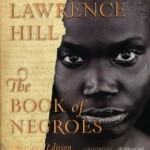 In Episode 2 Aminata Diallo is all grown up and attracting the master’s notice. (It’s going to be difficult to be vague about this episode because it sets up the major relationship arcs for the whole series.) In E1 we met Chekura, a slaver who was kind to young Aminata before finding himself beside her on the slave ship. Chekura and Aminata were not sold together. He’s back in a big way for Episode 2 of The Book of Negroes, but first let’s talk about the plantation. Aminata’s buyer, Robinson Appleby, is every bit the creep her previous white owners were not. Still, Aminata appears to have enjoyed some protection as she grew up. The end of that relative safety implies that Appleby is uniquely obsessed with Aminata, which I had a hard time cosigning. Aminata is given a certain amount of (admittedly minor) agency in her life. She chooses to remain in the fields, although Appleby can call her to the house whenever he likes. There’s a difficult but not graphic rape scene that has it’s horror underlined by the non-reaction of a small child in the vicinity. Life as a slave means a certain expectation of assault. It’s a problem for the series to show this aspect of life but not fetishize or dwell on it.
In Episode 2 Aminata Diallo is all grown up and attracting the master’s notice. (It’s going to be difficult to be vague about this episode because it sets up the major relationship arcs for the whole series.) In E1 we met Chekura, a slaver who was kind to young Aminata before finding himself beside her on the slave ship. Chekura and Aminata were not sold together. He’s back in a big way for Episode 2 of The Book of Negroes, but first let’s talk about the plantation. Aminata’s buyer, Robinson Appleby, is every bit the creep her previous white owners were not. Still, Aminata appears to have enjoyed some protection as she grew up. The end of that relative safety implies that Appleby is uniquely obsessed with Aminata, which I had a hard time cosigning. Aminata is given a certain amount of (admittedly minor) agency in her life. She chooses to remain in the fields, although Appleby can call her to the house whenever he likes. There’s a difficult but not graphic rape scene that has it’s horror underlined by the non-reaction of a small child in the vicinity. Life as a slave means a certain expectation of assault. It’s a problem for the series to show this aspect of life but not fetishize or dwell on it.
When Aminata was purchased it’s indicated that Appleby makes a habit of buying undervalued African slaves. We never meet any others. (There are a number of non-speaking / low line roles in The Book of Negroes. I wanted them to be less cyphers and more active parts of the tale.) The healer is accorded some respect and leeway as she keeps Appleby’s bargain bin purchases alive. As such, Aminata’s knowledge of medicine makes her a natural companion for the woman. She inoculates Aminata against smallpox. (a practice this article describes well while still managing to focus not on the man who gifted the colonies with it’s protection but on the master who is credited with discovering it.) For reasons not made clear, inoculation is not adopted by the white community of TBoN. E2 sees the rise of Aminata and Chekura’s relationship from a childhood kindness to an adult love. I didn’t buy it. To me, Chekura is less a man Aminata would love and more the last piece of her homeland she has. I didn’t see her fierce devotion as more than his deep guilt and her deep loss. Like Holocaust survivors walking out of the camps and vowing to start a family in spite of Hitler, their bond seemed rooted more in the past than the present.
In a fit of jealousy, Appleby arranges for Aminata to be sold. Here we meet the Lindo’s. These are classic progressives. They see themselves as somehow better than other slaveowners because they name their slave a servant and identify with her. Viewing their outcast status due to religion as akin to Aminata’s status as property, these are the white liberals we still struggle with today. Perpetuating the system while claiming to be better than it. Aminata’s increased range of movement as the Lindo’s servant allows her to pursue greater educational opportunities and see more of the new land she’s been living in. From revisiting the slave markets to being chased off a larger plantation, Aminata’s clear view shows a slave by any other name is still in chains.
Aminata declares Mrs Lindo a beloved friend, but I wasn’t so sure. Many of the betrayals Aminata experiences are clearly outlined by A Book of Negroes. Rosa Lindo is left in a grey area. Did she knowingly deceive Aminata to key events in Aminata’s life or was she also betrayed? My vote is Rosa played her, but the text lets you have it either way. It doesn’t matter. Mrs. Lindo exits before the end of the episode and Aminata is off to the next chapter of her life.
*This post originally appeared at Love In The Margins.
















